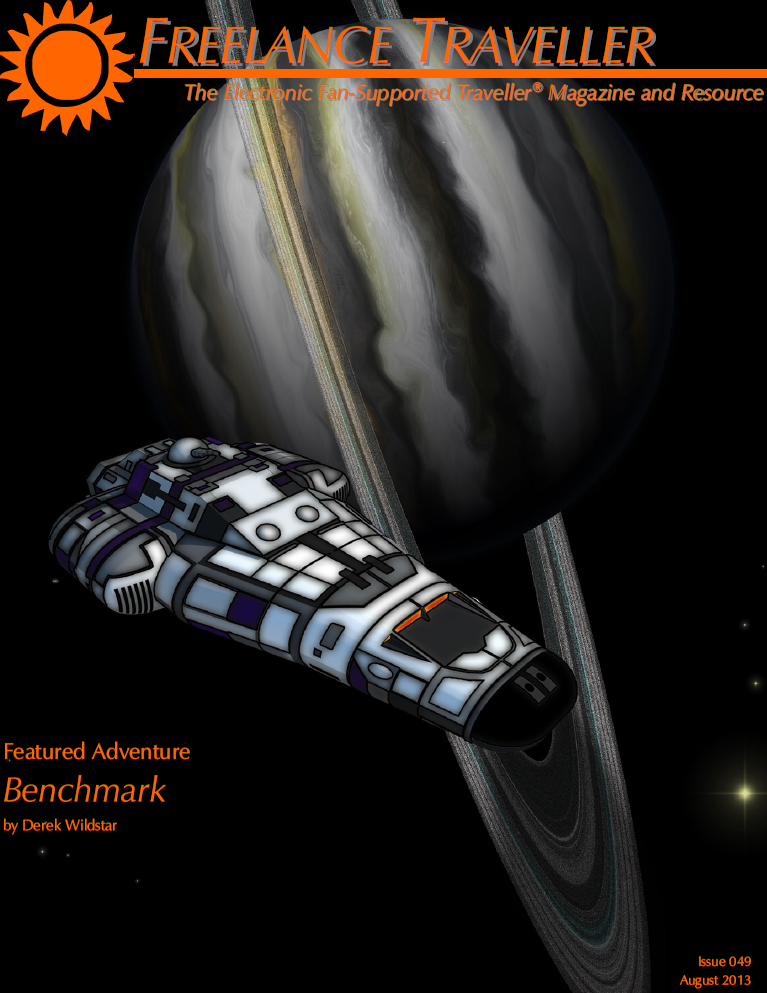| August 2013 | Department | Article Title | Author |
|---|---|---|---|
 |
From the Editor | Jeff Zeitlin | |
| Featured Article | |||
| Active Measures | Benchmark | Guy Garnett | |
| Critics' Corner | Spinwärts-Marken | Timothy Collinson | |
| Starfarers Gazette #2 | “kafka” | ||
| Off the Table: Science Fiction Hobby Games: A First Survey | Jeff Zeitlin | ||
| Attack Squadron: Roswell | “kafka” | ||
| The Shipyard | Mongoose Traveller Designs: Murmansk-class Scout Support Tender | Scott Diamond | |
| Raconteurs' Rest | Drop Out [Part 24] | Ken Murphy | |
| Doing It My Way | Character Detailing Rules: Starting Early | Bo Wozniak | |
| Expanding the UWP: Governments | Jeff Zeitlin and Glenn Grant | ||
| Confessions of a Newbie Referee | #2: Canon | Timothy Collinson | |
| Active Measures | The Sons of Rudurgu | Michael Brown | |
| Kurishdam | Games People Play: Sekhoma | Jeff Zeitlin | |
| In A Store Near You | The Showroom: Metzger- and Sintzernich-class Passenger Hovercraft | Ewan Quibell | |
Download this issue: ANSI A (US Letter) format or ISO A4 format
The articles listed and linked above are also linked in their appropriate sections of our website.
From the Editor
One of the strengths of Traveller has
always been that there’s room for characters and adventures that don’t
have or require combat skills. It is, perhaps, understandable that
scenarios that are open to combat dominate—but that’s largely a matter
of choice, rather than a near-necessity imposed by the system or
setting, due to a lack of development in non-combat areas.
But, how do you encourage players to explore non-combat scenarios?
Traveller has an answer to that: Make the player think about their character’s mortality. Traveller, in its first incarnation, was unique in that it was possible for a character to die before the game even started. That was pretty quickly house-ruled, and recent editions retain pre-game death only as an option.
But that wasn’t the only way Traveller could get players to care about their characters. The entire character generation process was itself a way: Instead of simply rolling up a set of stats and maybe a couple of default skills, and sending the character out into the world, Traveller provided a character generation process. Characters had ‘prior careers’ in which Things Happened, and the Things that Happened could influence the player’s choices for the character’s subsequent development. Even the choice of prior careers offered the options, from the beginning—the character with the scientific bent could aim for the Scouts, the wheeler-dealer could go for the Merchants, and the Combat Monster could go for the Army or Marines. But regardless of what you chose, you, the player, were in a sense right there alongside your character—and there’s never been a better way to bond with a buddy—or a character—than to share danger with him.
 Freelance
Traveller
Freelance
Traveller